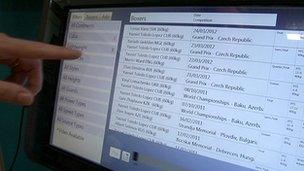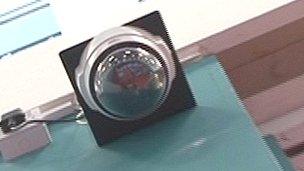2012 Olympics: iBoxer software packs punch for Team GB
- Published
iBoxer: Team GB's secret weapon
Performance analyst Robert Gibson fires up his computer in the bowels of the English Institute of Sport complex in Sheffield, home of GB Boxing - the squad that will represent Great Britain in the Olympics.
At first glance the screen shows the type of graphs that you might see in any office document.
But on closer inspection the axes of the graphs include headings like "Punches per round", "Cumulative punches", "Punch efficiency", "Punches per minute" and "Time between punches".
The emphasis is very much on punching.
iBoxer was specially developed for the GB Boxing squad. According to its developers, it is the most integrated performance-analysis system of its kind, and could make all the difference at the Olympics.
"iBoxer builds the boxers' confidence that they can defeat their opponent," explains Mr Gibson.
"Five years ago when I first started, we had videos all over the place in hard drives, laptops, desktops. What iBoxer has enabled us to do is pool all that information together into one central location that's easily shareable with the rest of the team."
At its core, iBoxer is a vast database containing information about some 20,000 boxers. It allows coaches and boxers to watch previous fights and combines this with statistical information from the International Amateur Boxing Association: boxers' weights, heights, and, more importantly, the judges' overall round scores.
"We'll maybe look at an opponent when he's losing, to figure out why and how he lost. We can look at one where they've won and look at their preferred punch, where they concentrate their efforts," says Mr Gibson.
"It enables us to triangulate different scenarios, to piece together a picture of the opponent, and from there develop a plan."
Footage comes from YouTube and DVDs. But primarily the archive is being built by the analysts themselves, who film matches.
In major televised competitions this can present a problem, because filming is strictly policed for copyright reasons. Analysts have to be "creative" in the ways they capture the fight footage, says Mr Gibson.
Anecdotally at least, boxing has the reputation of being an old-school sport with tough, no-nonsense coaches. Do they embrace the technology?

Luke Campbell of the GB Boxing Squad uses iBoxer to plan his fights
Mr Gibson looks incredulous. "Over the thousands of tactical briefings we've done over five years, the data suggests that this kind of preparation increases the boxer's success rate by around 25%. Why wouldn't you want to use it?"
With sweat dripping from his brow, world silver medallist Luke Campbell strides into the gym. He says he will always go with his coach's advice, but iBoxer has provided useful insights to help him prepare for the ring.
"For example, in the World Championships, the kid's got a big right hand, he lunges in with it… I was aware of that, I was counting on it all the time, so that was a useful fact to know", he reflects.
Mr Gibson points out the cameras dotted around the walls in the state-of-the-art gym, which was built with iBoxer in mind. One camera hangs from the ceiling, offering a bird's eye view of a ring.
The cameras can be used by coaches to offer instant training feedback, he explains.

Ringside terminals allow coaches to access the database
The cameras can also be used to capture fresh archive material.
If a delegation of Bulgarian boxers, for example, came for a friendly training camp in Sheffield, the gym's cameras, rigged up to the iBoxer Capture console, could record the action, "tag" the fighters, and ingest and catalogue it for future reference.
When squads from rival nations visit Sheffield for training and witness the new technology in action, they are typically amazed, according to Gibson, and keen to get their hands on the kit.
However, it is a new app called Hit Counter which Mr Gibson believes will give Team GB the edge in the Olympics.
"It's so secret even some of our coaches don't know about it", he says.
The app allows analysts to manually key information into smartphones and tablets during a fight. This yields more detailed data than the official judges' report, allowing "real-time analytics" of a bout, like the detailed punch analysis Mr Gibson showed off in his office, enriching the iBoxer archive.
"It will show where boxers concentrate their efforts through a bout, whether they are a single-shot boxer or prefer to throw combinations", says Mr Gibson.

Wall-mounted cameras in GB Boxing's state-of-the-art facility in Sheffield record the action
"It also measures work rate or tempo, so we can see if they start fast, [or] fade through the round, to see if there are opportunities for us to take the initiative, either through fatigue or loss of concentration."
And of course the app can be used to analyse opponents when judges are not recording the event, for example during open training.
But however good this software may be, when it comes to a competitive match like in the Olympics, the boxer will be on his own in the ring.
"We'd be hung, drawn and quartered if we tried to pass this information to the boxer during a match," warns Mr Gibson. Electronic devices are not allowed ringside, and nobody can communicate with the coaches, never mind the boxers.
- Published17 July 2012
- Published10 July 2012